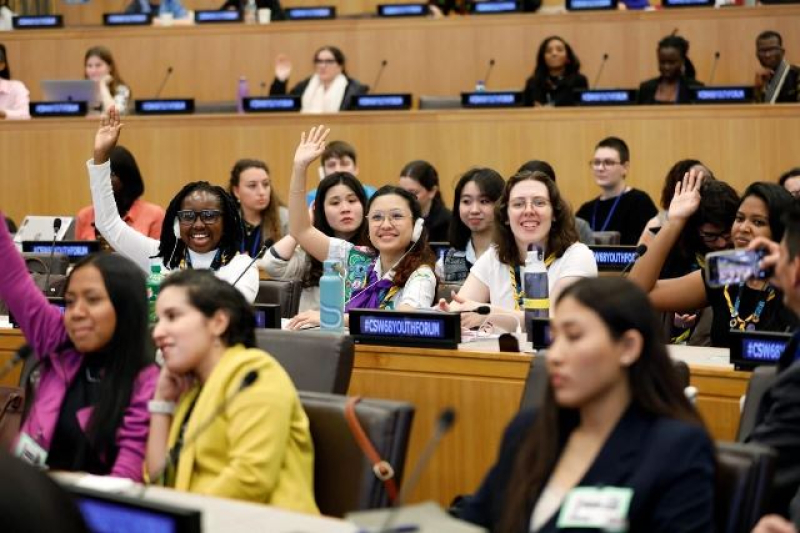- ‘With Science, We Can Feed the World of 9.7 Billion by 2050′ |
- WHO warns of severe disruptions to health services for funding cuts |
- ICJ hears Sudan’s case accusing UAE of ‘complicity in genocide’ |
- Bombardment, deprivation and displacement continue in Gaza |
- Aged and Alone: The hidden pains in old age homes |
UN Commission delivers blueprint to end women’s poverty

UN Commission delivers blueprint to end women’s poverty
New York, Mar 23 - The 68th session of the Commission on the Status of Women (CSW68) has concluded, marking a significant step towards eradicating women’s and girls’ poverty.
Over the twelve-day session, which ended on Friday, UN Member States committed to robust measures to strengthen financing and institutions to address poverty and ensure gender parity.
The commission emphasised the urgent need to invest in gender-focused initiatives to promote gender equality and mitigate the impacts of climate change. It highlighted the stark reality that one in every ten women globally lives in extreme poverty, with more than 614 million women residing in conflict-affected areas, where they are 7.7 times more likely to face extreme poverty.
A concerning projection indicates that climate change could exacerbate hunger for 236 million more women by 2030, effectively doubling the number of affected men.
In response to these challenges, this year’s secondary agenda focused on strengthening institutions, social protection systems, and financing with a gender perspective. During the side events, members put forward strategies outlining a forward-thinking framework designed to bolster women’s economic autonomy while confronting economic structures that have entrenched inequalities domestically and internationally.
Globally, 10.3 per cent of women live in extreme poverty today, according to the report presented by the UN Secretary-General to the Commission, and progress towards ending poverty needs to be 26 times faster to achieve the Sustainable Development Goals by 2030.
The outcome document (or Agreed Conclusions) recognises that women and girls living in poverty become ‘shock absorbers’ in times of crisis, and that further efforts are needed to increase resources to address women’s and girls’ poverty.
Acknowledging that the international financial architecture is not fit for a crisis-prone world, the Commission called for reforms to enable countries to mobilise and invest resources in gender equality. These measures include debt relief and progressive taxation, and ensuring that public resources are allocated to address the needs and rights of women and girls.
The Agreed Conclusions also recommend mobilising financial resources from public and private sources, strengthening the international financial architecture, ensuring a gender lens in national budgeting processes, and preventing regressive taxation disproportionately impacting women and girls with low or no income.
The outcome document also notes that official development assistance must be increased to address women’s and girls’ poverty. The share of total aid with gender equality as a policy objective decreased for the first time in a decade from 45 in 2019 to 43 per cent in 2020, per the latest data from the Organisation for Economic Co-operation and Development (OECD).
The Commission also called for implementing gender-responsive economic and social policies, including increased women’s representation, leadership and participation in economic institutions, enforcing core labour standards to ensure equal pay for work of equal value, and implementing policies to support women-owned businesses.
Engaging and financing women’s organisations is another key recommendation. Robust, flexible and multi-year financing for locally-led feminist movements and women’s rights organisations is critical to addressing poverty, as proven by existing mechanisms such as the UN Trust Fund to End Violence Against Women and the Women’s Peace and Humanitarian Fund.
The Agreed Conclusions also call to strengthen national capacities to collect and use disaggregated data on multidimensional poverty, and to adopt new development strategies towards sustainable economies. These include strengthening inclusive and gender-responsive social protection systems and scaling up investment in the care economy to reduce women’s time and income poverty and expand their employment opportunities.
During the session, the Commission also adopted a resolution on HIV-AIDS led by the Southern Africa Development Community (SADC), which calls to increase investment in gender equality and the empowerment of all women and girls in the HIV-AIDS response.
The two-week session is the largest UN gathering on gender equality. CSW68 brought together world leaders – including two Heads of State, three vice-presidents and over 100 Ministers – and 4,800 representatives of civil-society organizations, marking the second-highest attendance in CSW records.
On the sidelines of CSW68, approximately 270 side events were organised by UN Member States, intergovernmental organizations and UN entities; and more than 760 parallel events were organized by civil society and youth-led organizations as part of the NGO CSW68 Forum.
The participation of young people, including adolescent girls, across the various sessions, including the Youth Forum, enabled youth delegates to exchange experiences, knowledge, lessons learned and good practices with an emphasis on the multiple dimensions of inequality which exacerbate how young women and girls experience poverty. The sessions, particularly the Youth Interactive Dialogue, demonstrated the importance of continuing with the practice of integrating critical youth perspectives in the official sessions of the CSW.-UNB

